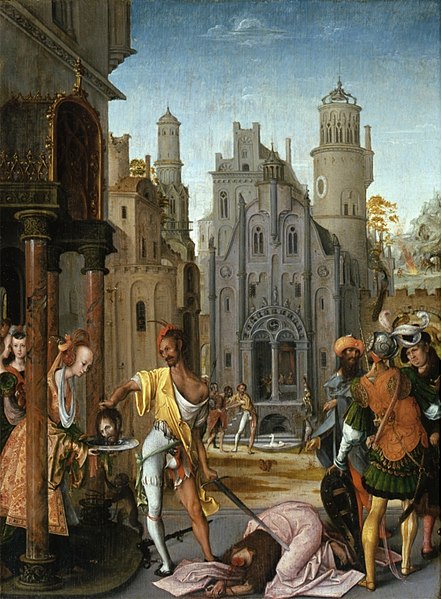The death of John the Baptist
Herod’s opinion of Jesus. His Murder of John Baptist.
(The Gospel History, Section 60)

The death of John the Baptist
(The Saviour of the World, Vol III Book IV Poem LI)
See, in grim fastness by Dead Sea,
Unwonted signs of revelry!
Soldiers and servitors about,
Bold chafferers with noisy rout;
Gay cavalcade and grave, great lord,
To council called, or festive board;—
By all these signs, the King, we know,
Come with his ladies, lords enow:
The desert he makes populous
With all his train tumultuous!
········
See, Herod sits in state amongst his lords,
Who watch his eye, acclaim his vainest words:
The wine flows free; the king has liberal grown,
No churl is he to-day, but spends his own:
Who enters there? A maiden rare to see,
Intruder on the royal revelry:
········
Now, see her dance, give play to all her grace,
Till sensuous rapture shines on every face:
Salome, daughter of a mother wise,
Displays her graces in the monarch’s eyes,—
A draught for every lip at royal board;
The King is grateful, nay, he will accord
Gifts fair, most rich! Now see him in his wine
Rise, liberal, to give: “It shall be thine,
If half my kingdom serve thee! Have no fear;
The boon thou cravest shall not prove too dear,
Too hard for him, the King, thou grac’st to-day
With thy fair beauties’ generous display!”
“My opportunity!” Salome thought;—
“Now, what to choose? estates, or slaves, or gold?”
Bewildered, all embarrassed by too much
Almost in grasp,—“I’ll to my mother go!
This moment is too golden for my use;
The Queen will better know to name that gift
The king in his cups would grace me with to-day!”
Her mother sought she, (who had decked her out,
Foreseen the issue, waited eager, strain’d,
To learn,—the king did generous incline
To give the utmost Salome should beg):
“What shall I ask, my mother?” Never doubt
She had her answer ready: “What to thee
The King’s most lavish gift—to half his realm?
Hath the King aught that is not mine and thine?
How shall he give thee what e’en now thou hast?
We lift full cup—but poison’s in the draught;—
My life’s abhorrèd for John Baptist’s sake!
Would I were dead, unknowing how the King
Lends ear to John; grave, ponders all his prate,
And tells me, me! how sore his conscience works,
For John hath bid him put away his wife
Due-mated to another! Herod is weak!
Why heeds he all this talk of righteousness,
Of tempered rule of flesh,—judgment to come,—
That day by day to hear he seeks out John,
Unkingly, in his dungeon? leaves my side
In hour of dalliance sweet; at public joust
Allows me to sit alone while steals he forth
To sit at feet of his prophet—so he styles
This bedouin of the desert!—trembles to hear,
(And tells me how he trembles!) this rude man
Denounce to his face the King, his nobles great,
The careless ways of th’ court, and chief of all,
The Queen he hates—knowing the easy king
Would yield him to his guidance, I, removed!
Now, mark me, girl! A day will come, and soon,
Your mother’s blood shall wash away that sin
John tells him he hath done in wedding me!
No rest, no joy have I, nor sleep nor play
Yields me an interval of pause from thought,—
How I shall compass his, my enemy’s, life!
He, dead, full easy sit I on the throne
With none to share dominion o’er the king—
His public acts and his most secret thoughts!
But, John alive, tasteless as Dead Sea fruit
Those envied honours, riches, reverence, joys,
Fall to my share as Queen!
“And yet thou ask’st,
Callous of heart as young things wont to be,
Askest with puling innocence, forsooth,
‘What boon, my Mother, ask I of the King?’
Return to th’ feast, cry out before his lords,—
‘Give me John Baptist’s head!’ Herod, ashamed
To break his silly word ’fore all his court,
Will straight commission one to go with axe,
Cut head from his body—would that I were there!—
No puling, now,—in the King’s presence wait
Till he come back—red axe, and bleeding head
Borne stately on a charger; steady thy heart;
Lift thou with thine own hands the ghastly dish,—
Bring hither to thy Mother! She will bless
(If any God hear prayer of blood-stained lips!)
The daughter who by one consummate act
Shall ease her Mother’s life of every grief!”
Salome heard, infected by the rage
Of love and jealousy, wild headlong hate,
Her mother’s words imparted: forth she went,—
In strength of borrowed passion, begged her boon:
And he, the greatest born of woman, fell,
Slain by a woman’s hate of righteousness!
St. Mark vi. 17-28.
St. Matthew xiv. 3-11.
[1] The Beheading of John the Baptist
“In the landscape the Baptist is represented praying in a solitary forest, preaching on a rocky hill to a group of seven persons, pointing out our Lord to his listeners, baptizing Him, pointing Him out to Andrew and John, and being led to prison. . .The daughter of Herodias is dancing before the King to music played by minstrels in the gallery of the banqueting-hall, and in the immediate front she is holding out a dish on which the executioner is depositing the head of Saint John.”
Hans Memling, by W. H. I. Weale.